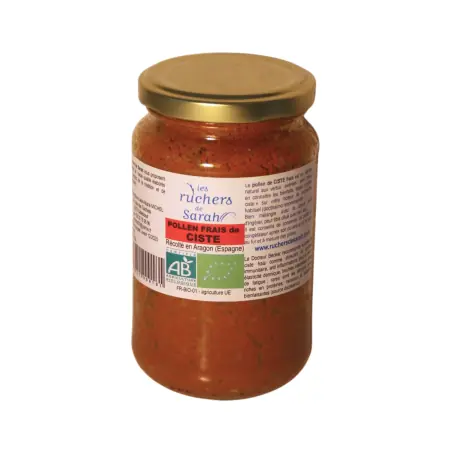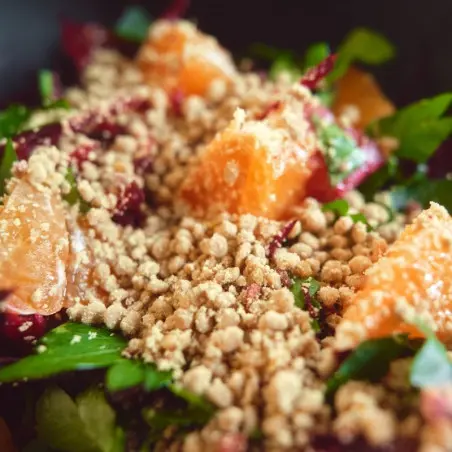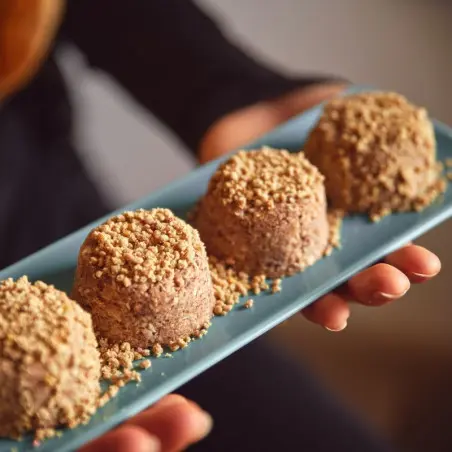LeThe flower pollen is a natural substance produced by flowers to help with the pollination and reproduction of plants. However, flower pollen is not only beneficial for plants, It can also offer many benefits for human health.. In this article, we will examine the health and wellness benefits of flower pollen.
What is the composition of flower pollen ?
LeThe pollen is a complex substance, rich in essential nutrients that can offer numerous health and well-being benefits. Its composition varies from one plant to another and depending on its processing method, but generally, it contains:
Proteins: Flower pollen has a protein content ranging from 20-40%. Its protein concentration is considered one of the most complete sources in nature, as it makes up more than a quarter of the pollen's mass and contains all the essential amino acids needed to build and repair body tissues.
Vitamins and minerals: Flower pollen also contains B-group vitamins such as vitamin B9, vitamin B2, vitamin B3, and vitamin B6, as well as vitamins C, D, E, and K, and minerals such as calcium, magnesium, potassium, iron, zinc, and selenium.
Lipids and carbohydrates: They are present each with a content ranging from 2% to 14% for lipids, including essential fatty acids, and from 35% to 55% for carbohydrates, which are mainly composed of glucose and fructose.
Enzymes: The enzymes in flower pollen can help improve digestive health by breaking down food and enhancing digestion.
Antioxidants: Pollen is also rich in antioxidants, which are compounds that can help protect cells against damage caused by free radicals. These primarily include flavonoids, carotenoids, and phenolic acids.
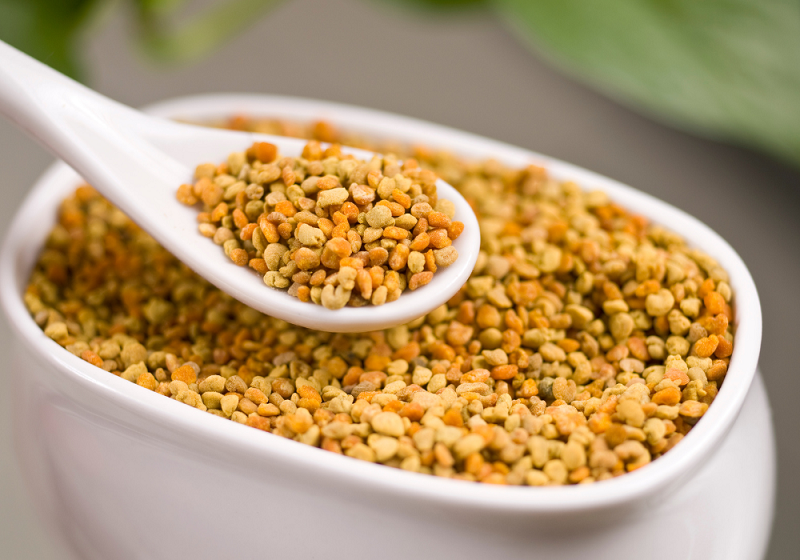
How to use flower pollen ?
LeThe flower pollen can be used in different ways, depending on your personal preferences and the form in which it is available. Here are some common ways to consume pollen:
As a dietary supplement: Flower pollen is often sold in the form of tablets, capsules, or powder for use as a dietary supplement. Follow the instructions on the packaging to know the recommended dosage.
Added to smoothies: It is possible to add a tablespoon of fresh pollen, available in health food stores or grocery stores, to your smoothie for additional nutrients.
Sprinkled on cereals: Pollen can be sprinkled on cereal or a fruit salad to add texture and nutrients.
Incorporated into pastry recipes: It can be used as an ingredient in baking recipes to add flavor and nutrition.
Consumed directly: Flower pollen can be consumed directly by mouth. It is generally available in the form of small yellow granules, which have a grainy texture and a sweet, floral flavor. You can find it at your local store. Biovie different types of fresh pollen such as: the fresh cistus pollen, ", the" fresh chestnut pollen "or even the" fresh hawthorn pollen. The pollen from flowers has distinct floral origins, which allows it to be a superfood.
How much pollen per day ?
The recommended amount of flower pollen depends on several factors such as age, weight, and the person's health condition. The daily recommended doses can vary depending on the brands and manufacturers of flower pollen supplements.
In general, it is advised to start consuming small amounts of pollen to see if the person does not have any adverse effects, and to gradually increase the dose if necessary. The recommended daily dose is about 1 to 2 teaspoons of dry pollen for a healthy adult. It can be consumed directly by mouth or added to cereals and smoothies. You can also do a fresh pollen cure, which typically lasts 6 weeks, to be done during seasonal changes.
If, however, you have a chronic illness, concerns about the amount to consume, or if you notice unpleasant reactions such as redness when consuming it, it is best to consult a qualified healthcare professional.
How is flower pollen made and harvested ?
The flower pollen is produced in the anthers of the stamens (reproductive organs male) of flowers. The production begins when the stamens develop and mature. The pollen grains are then released from the anthers and dispersed into the air by the wind or transported by pollinators such as bees, butterflies, or birds.
Flowers can be pollinated in a manner crossroads, that is to say, the pollen from one flower is transferred onto the pistil (female reproductive organ) of another flower of the same species. In other cases, pollination can be autogame, which means that the pollen is transferred to the pistil of the same flower.
The collection of pollen can be done manually using a tool called a "pollen comb," or mechanically using special machines that shake the pollen from the flowers. If you are a beekeeper and wish to collect pollen from your hive thanks to the pollination by your bees, you simply need to use a pollen trap for your hive, which consists of a pollen comb, a grid, and a pollen drawer.
Once harvested, pollen can be dried and stored; this is known as dry pollen: the pollen grains are collected from flowers and then dried to remove all moisture. Dry pollen is generally used as a dietary supplement or for allergy testing. It can also be placed in a freezer after harvesting to be preserved, in which case it is called frozen pollen: the freezing process preserves the nutrients in the pollen, making it an ideal option for dietary supplements and skincare products.
In terms of nutritional value, frozen pollen is generally considered superior to dried pollen because it retains all its nutrients. Dried pollen is simply more convenient to store and transport as it can be kept at room temperature.
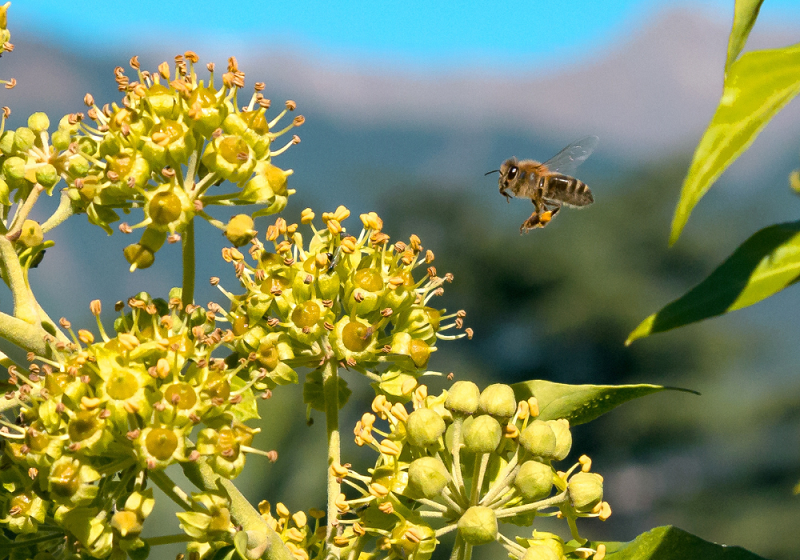
What are the benefits of flower pollen ?
Flower pollen is considered a superfood rich in nutrients and beneficial compounds for health, and an excellent source of benefits. Here are some of its potential virtues:
- It is a nutrient source very rich in proteins, carbohydrates, essential fatty acids, vitamins (A, C, D, E, K, and several B vitamins), and minerals (calcium, iron, magnesium, potassium, zinc).
- It possesses anti-inflammatory properties due to the presence of flavonoids, polyphenols, and other antioxidant compounds.
- Pollen can help combat oxidative stress due to its antioxidant content, which can help neutralize free radicals and thus reduce oxidative stress.
- It is an excellent immune system booster because it contains polysaccharides, peptides, and other compounds that can stimulate it.
- It is known to increase energy and endurance, which can be useful for athletes or people who lead an active lifestyle, and it is recommended in cases of physical fatigue or persistent fatigue.
- Cistus pollen has beneficial properties for digestive health that help to relieve intestinal disorders.
- It can help reduce stress and anxiety thanks to its adaptogenic properties.
Conclusion:
Pollen is a naturally nutrient-rich food that is beneficial for health. In addition to being a source of proteins and vitamins, it also contains antioxidants, essential fatty acids, and digestive enzymes. The anti-inflammatory and immune-boosting properties of pollen make it an interesting dietary supplement for strengthening the immune system and helping to combat allergies. However, it is important to note that pollen can also cause allergic reactions in some people. Ultimately, pollen can be a truly beneficial addition to a balanced diet, but it is important to follow the advice of a healthcare professional.



